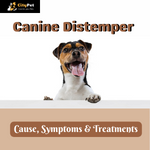Canine Distemper in Dogs: Causes, Symptoms & Treatments
Canine distemper is a highly contagious viral disease that affects dogs and other animals, including foxes, wolves, raccoons, and ferrets. The virus that causes canine distemper is called the canine distemper virus (CDV). The disease is spread through contact with infected animals or their bodily fluids, such as saliva, urine, or feces.
The symptoms of canine distemper can vary widely depending on the infection’s severity, the animal’s age and health, and other factors. Common symptoms include fever, coughing, sneezing, discharge from the nose and eyes, lethargy, loss of appetite, vomiting, diarrhea, seizures, and paralysis.
There is no cure for canine distemper, but there are vaccines that can help prevent the disease. Treatment for infected animals typically involves supportive care, such as intravenous fluids, antibiotics to prevent secondary infections, and medications from controlling symptoms such as seizures. However, even with aggressive treatment, many animals with canine distemper do not survive.
Causes of Canine Distemper:
Canine distemper is caused by the canine distemper virus (CDV) called canine morbillivirus. It is a highly contagious virus that is spread from one dog to another through contact with an infected animal’s body fluids, including urine, feces, saliva, and respiratory secretions.
The virus can also be transmitted through airborne particles or contaminated objects like food and water bowls, toys, and bedding. Infected animals can shed the virus for weeks after they recover, and even dogs that show no symptoms can still spread the disease.
Unvaccinated dogs and puppies are at the highest risk of contracting the disease, as are dogs that live in overcrowded or unsanitary conditions. Wildlife species such as raccoons, foxes, and skunks are also common carriers of the virus and can infect domestic dogs.
Unvaccinated dogs and puppies, as well as dogs with weakened immune systems, are most susceptible to the virus.
Symptoms of Canine Distemper:
The symptoms of canine distemper can vary depending on the severity of the infection and the affected dog’s age, immune system, and overall health condition. Some of the common symptoms include:
- Fever
- Loss of appetite
- Lethargy
- Coughing
- Sneezing
- Nasal and eye discharge
- Vomiting
- Diarrhea
- Dehydration
- Weight loss
- Thickening and hardening of the paw pads and nose
- Seizures
- Muscle twitches
- Paralysis
- Behavioral changes, such as aggression or depression
In puppies, the virus can cause enamel hypoplasia, which is permanent damage to the teeth that appear discolored or with holes.
Dogs with severe cases of distemper may develop neurological symptoms, including tremors, convulsions, and circling behavior. The symptoms usually appear within 1 to 3 weeks after exposure to the virus and can last for several weeks or months.
Diagnosis:
Diagnosing canine distemper requires a thorough physical examination and a combination of laboratory tests and clinical signs. Your veterinarian may look for signs of respiratory, gastrointestinal, or neurological symptoms and may perform various tests, including:
- Blood tests: A complete blood count (CBC) and a biochemistry panel can provide information about the dog’s immune system, organ function, and overall health condition.
- Urine tests: A urinalysis can help identify any urinary tract infections or dehydration.
- Polymerase chain reaction (PCR) test: This test detects the presence of the distemper virus in the blood, urine, or other body fluids and tissues.
- Serology test: This test checks for the presence of antibodies against the distemper virus in the blood.
- Chest X-rays: X-rays can reveal any signs of pneumonia or respiratory distress.
- Neurological examination: A neurological examination can identify any signs of seizures, muscle twitches, or other neurological symptoms.
It is essential to provide your veterinarian with a complete medical history and information about the dog’s vaccination status, as this can help determine the likelihood of distemper infection. Early detection and treatment are crucial to managing the symptoms and improving the dog’s chances of recovery.
Treatments:
There is no cure for canine distemper, and treatment mainly focuses on managing the symptoms and preventing secondary infections. The treatment plan can vary depending on the severity of the infection and the affected dog’s age and overall health condition. Some of the common treatments include:
- Isolation: Infected dogs should be isolated from other animals to prevent the spread of the virus.
- Fluid therapy: Dehydration is a common complication of distemper, and dogs may need intravenous fluids to maintain hydration.
- Antibiotics: Secondary bacterial infections can occur in dogs with distemper, and antibiotics may be necessary to treat these infections.
- Anti-seizure medications: Dogs with neurological symptoms may require anti-seizure medications to manage the seizures.
- Medications to control vomiting and diarrhea: To prevent dehydration, dogs with vomiting and diarrhea may need medication to control these symptoms.
- Nutritional support: Dogs with distemper may lose their appetite, and nutritional support may be necessary to maintain their weight and strength.
- Eye and nose drops: Medications such as antivirals or antibiotics may be prescribed in the form of eye and nose drops to treat ocular and respiratory symptoms.
Prevention is the best strategy against distemper, and vaccination is the most effective way to protect dogs from the virus. Regular veterinary checkups and maintaining a healthy immune system can also help prevent the disease.
Summary:
In this article, we learn about canine distemper which is a highly contagious viral disease that affects dogs and other animals, including raccoons, foxes, and ferrets.
The virus attacks the respiratory, gastrointestinal, and nervous systems of the infected animal, causing symptoms such as fever, coughing, sneezing, vomiting, diarrhea, seizures, and paralysis. The disease is often fatal and Vaccination is the most effective way to prevent canine distemper.






